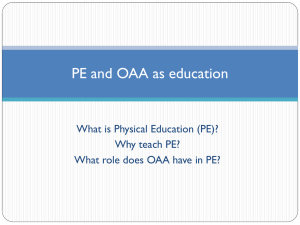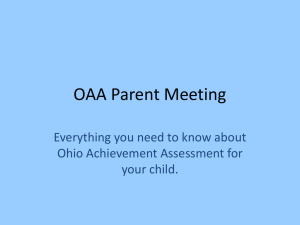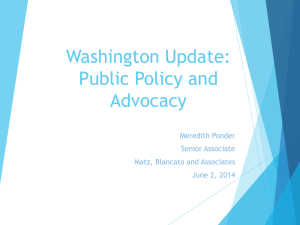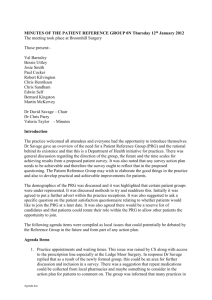Academic Affairs - University College Cork
advertisement
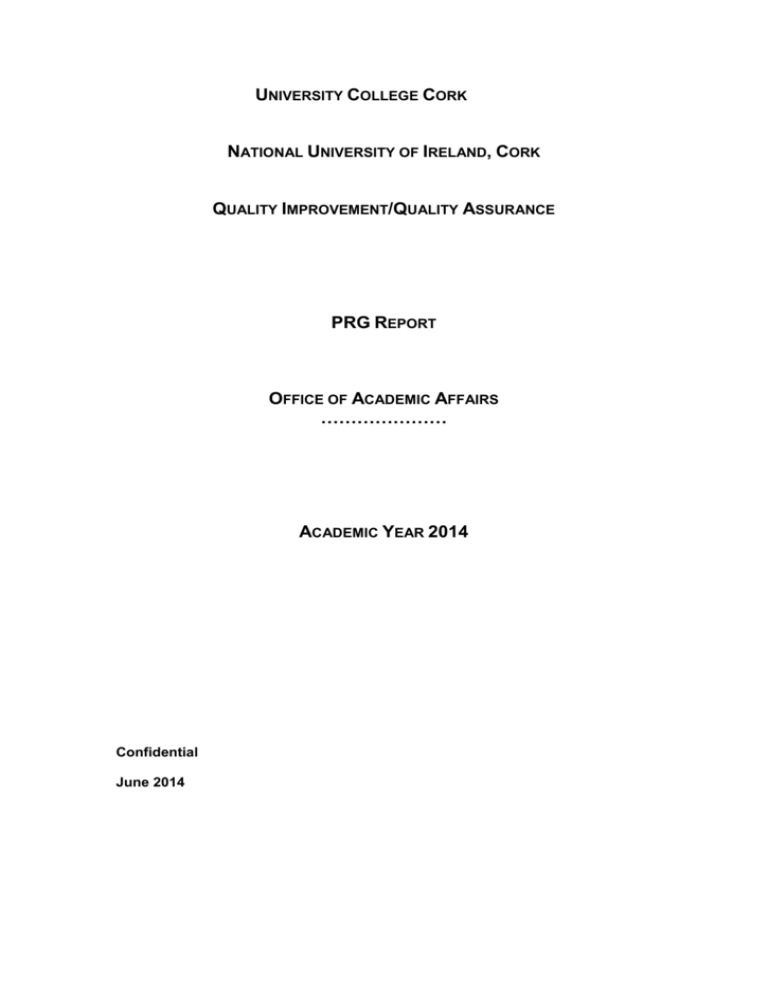
UNIVERSITY COLLEGE CORK NATIONAL UNIVERSITY OF IRELAND, CORK QUALITY IMPROVEMENT/QUALITY ASSURANCE PRG REPORT OFFICE OF ACADEMIC AFFAIRS ………………… ACADEMIC YEAR 2014 Confidential June 2014 PRG MEMBERS Name Affiliation Role 1. Ms Ros Boyne Formerly Academic Registrar Birmingham City University 2. Dr Michael Gilmore Academic Registrar Durham University 3. Mr Gavin LynchFrahill Student’s Union Education Officer University College Cork 4. Prof Eithne Guilfoyle Vice President for Academic Affairs (Registrar) Dublin City University 5. Ms Colette McKenna (Chair) 6. Dr Suzanne Timmons University College Cork Director, UCC Library Senior Lecturer, Centre for Gerontology & Rehabilitation University College Cork TIMETABLE OF THE SITE VISIT The timetable for the visit is attached at Appendix A. The Peer Review Group (PRG) felt that the timetable was appropriate but very demanding. During the visit it was amended at the request of the PRG to include additional individual meetings with the Registrar and the Academic Secretary, to accommodate a late request from a member of the unit to meet the PRG and because a member of staff was unexpectedly unavailable. The PRG found it helpful to meet a large number of staff from the Office of Academic Affairs (OAA) as well as students and other users of the services provided by the OAA. However, it suggests that consideration should be given in future peer reviews to reducing the number of individual interviews because such a change would give members of PRGs more time to reflect between meetings. During the first morning of the visit members of the PRG split into two groups to interview individual members of staff from the OAA. All members of the PRG attended all the other meetings listed in Appendix A. Representatives of the PRG also visited the various offices used by the OAA. PEER REVIEW The PRG shared responsibility for the conduct of the review and for the preparation of the report. They agreed their conclusions at the end of the site visit and communicated electronically to draft and agree the final report. The PRG wish to thank everyone they met for their constructive engagement with the process and their helpful comments. They also wish to record their gratitude for all the help and Page 2 of 19 support they received from Ms Aoife Ni Neill and Ms Fiona Crozier throughout the process. OVERALL ANALYSIS Self-assessment Report Staff of the OAA presented one Self-Assessment Report (SAR) which covered the seven offices that form the OAA. The PRG felt that the SAR was clear and comprehensive and contained a commendably thorough SWOT. The SAR made a number of recommendations which ranged from matters related to the internal organisation of the OAA to University strategy. The PRG felt that the recommendations made in the SAR were appropriate. The Registrar and Academic Secretary said they had encouraged the staff of the OAA to take responsibility for the preparation and content of the SAR. This approach was very useful in terms of encouraging self-reflection and allowing staff to take ownership of the process. The PRG concluded, however, that the SAR failed to celebrate sufficiently the extent to which the work of the various offices is coordinated. They also noted that the SAR was mainly focussed on the internal organisation of the OAA and they felt that a more externally facing focus would have been beneficial. The focus of the SAR reflects the position staff of the OAA feel they have within the University: their perception is that the OAA has a low profile and that the value of their work is not sufficiently evident or appreciated. SWOT Analysis The SWOT Analysis was self-reflective and comprehensive in its analysis of the unit. The PRG commends the staff of the OAA for the openness with which they engaged in the peer review process and with the SWOT analysis. They noted that a large number of staff had participated in the preparation of the SWOT and that an external facilitator had been used to facilitate the process. Benchmarking The benchmarking exercise focused on a qualitative assessment of the services provided by three institutions: the National University of Ireland, Galway; Dublin City University and the University of Exeter. The PRG recognised that the University’s intention to develop a Student Hub had guided the selection of these institutions and the nature of discussions held with staff from them. The PRG noted that the OAA staff who visited these institutions recognised the value of the processes they observed and were keen to adopt appropriate aspects of those processes at UCC. FINDINGS OF THE PEER REVIEW GROUP Organisation of the OAA The Academic Secretary, Mr Paul O’Donovan, is the head of the OAA. He reports to the Registrar and Senior Vice President (Academic), Professor Paul Giller. The establishment of the OAA numbers 54 but there are currently 7 vacancies. The OAA comprises seven offices: Academic Secretariat, Academic Programmes and Regulations, Systems Administration, Admissions, Graduate Studies, International Education (Operations) and Student Records and Examinations. Each Page 3 of 19 of these offices has a distinct remit. The staff in each office are led by a head of office who reports directly to the Academic Secretary. It is clear that the teams in the offices work well together and that that there is good communication across the offices. The PRG was made aware of how difficult it was for the OAA to maintain service levels while carrying such a high number of vacancies, particularly as most of the vacancies are concentrated in two of the constituent offices. The PRG was very impressed by the professionalism and commitment of staff who were doing everything they could to ensure that staff, students and others did not suffer as a result of the current resource problems. Strategy The development of the University’s Strategic Plan was an institutional activity. The strategic plan determines the strategic objectives which annual operational plans are designed to meet. Staff of the OAA have informed and influenced the development of the University’s strategic plan, its operational plans and academic strategy, and the unit’s work is strongly informed by these plans, but it does not have a separate strategic or annual operational plan, as the SAR recognised. Nonetheless within the institution, some strategies have been developed by separate functional areas to deliver on key institutional goals. Some of these relate to the work of the OAA but do not take full account of the actual or potential contribution from the OAA. The Student Experience Strategy and the Teaching and Learning Strategies are cases in point. The OAA delivers some key student services and yet the Student Experience Strategy pays little attention to this contribution, other than recognising the need for an ‘integrated student administrative interface’ as an aspect of the Hub project. The work of the OAA in the management of the curriculum approval processes could be harnessed to strengthen the integration of research, teaching and learning, but this potential contribution to curriculum development is not explicitly recognised in the Teaching and Learning Strategy. The problem is a dilemma around whether these sub-strategies are best considered as strategies for particular units or whether they should be thematic strategies for implementation across units, and the OAA is caught on the horns of this institutional dilemma. In the absence of a resolution of the dilemma, the SAR has identified a way forward which would ensure that the unit does not become merely reactive. A number of institutional discussions have taken place to frame an Academic Strategy for UCC within the context of the new Strategic Plan. Of the six key elements of this framework strategy, four are particularly relevant to the OAA namely: University size and shape, mode of teaching and learning delivery, portfolio of programmes, and internationalisation and partnerships. The SAR recognises that it would be beneficial to extract the goals and targets that pertain to the OAA and to use this information to establish the unit’s own operational plan, prioritising key projects necessary to maintain and improve current levels of service and enabling them to support the demands of the academic mission. An OAA Operational Plan would also facilitate communication of medium to longer term plans and projects to all staff in the Page 4 of 19 unit, which would respond to the concern raised by a number of staff that the strategic and operational goals of the unit are not clearly communicated. That said, simply adopting a ‘top down’ strategic approach has its limitations. This approach risks missing possible innovations from within the OAA which could benefit staff and students on a wide scale. A top-down strategic approach has already resulted in a sequence of organisational changes around the complex arrangements for admissions, across International Education (Operations), Graduate Studies Office and the Admissions Office. In the case of International Education (Operations), the commercially driven recruitment function is not separate from the quality assurance function required to safeguard admissions standards and fair process, which creates an inherent and unnecessary risk to quality assurance. The development of CPD modules through the Centre for Adult Continuing Education has similarly been driven strategically, but without thinking through the organisational implications for the capturing of the student record for external accountability. The potential mismatch between strategy and implementation highlights the need for improved regard for the strategic value of the OAA and engagement of the OAA with the senior management team and the wider University. The PRG therefore recommends that the University, in its approach to strategic planning, should recognise wider contributions to institutional strategic themes than that made by particular managerial units, such that it better recognises the strategic value and contribution of the offices of the OAA. Use of project management methodology The approach taken of using a formal project management methodology has been employed to great effect in the semesterisation project. This project, which has required full buy-in from the academic community and support departments is an example of good practice. It is evident that a wide range of staff in the OAA have been fully involved in this project and that their contributions to both planning and implementation have been valued. This project has also afforded the opportunity for staff to work in cross-functional teams both within the unit and across the institution. It is recommended that such an approach should be employed in existing and future projects. It is further recommended that a light touch approach such as PMLITE should be considered when implementing future business process reviews. This would have the advantage of involving all relevant staff in the unit working in a matrix approach. It would also increase the visibility of the OAA across the University and hence recognition of the value of its work in supporting the institution. Service Delivery and Structure The PRG found evidence of a student-centred ethos throughout the OAA. Internal and external stakeholders spoke of the high level of accountability in relation to working with the student body. Each office team takes ownership of the processes they manage and takes responsibility for the outcome of those processes. The staff respect the work of their colleagues in their own office and in the other offices of the OAA. There is evidence that closely related functions are disaggregated both across the offices in the OAA Page 5 of 19 and with other parts of the University. For example, aspects of the marketing function take place in the Admissions Office, the Colleges and the Marketing Office; some admissions are handled by the Admissions Office, some by the Graduate Studies Office and some by the International Office (Operations); finally, support for first year students is provided by both the Admissions Office and the Student Experience Office. The PRG recognises that some disaggregation of function is inevitable and indeed desirable, but it is likely that in some instances it may be reducing efficiency and causing confusion to service users. The PRG was told, for example, that sometimes students are sent to several different offices across the institution before their query is addressed. The planned cross functional Student Information Desk (the Student Hub) should reduce the confusion to service users, but the opportunity that will be provided by this development should also be taken to consider service efficiency. Some confusion was also raised by those who use the website of the various offices. There is no overarching OAA website and thus there is some overlap of information. It is therefore timely that the OAA has begun to work on establishing a new CRM system for the University. The PRG recommends that the OAA consider how to optimise its website to ensure information is presented from the perspective of users. Building on the work already completed in some offices within OAA, the PRG suggests that the OAA should systematically complete the gathering of robust data on the use of their services, so that the OAA has comprehensive evidence of who uses the services, for what reason and how frequently. These data should then be used to assist in a thorough review of the business processes that are carried out within the offices. The aims of this review would be to make the processes more effective and efficient and to improve communications with users, thereby improving services and reducing staff-workload. The results of this review should also provide a strong evidence base for any necessary restructuring of the office teams and redesign of the services they provide, particularly in relation to the development of the Student Hub. The PRG recommends that any major changes to the way services are delivered by the OAA (including via the new Student Hub) should be based on the information gained from a business process review such as that described above. Institutional Visibility of the OAA One of the recommendations made in the SAR refers to a need to raise the profile of ‘admin’ functions across the University by underlining the professional support and service provided by the OAA to the whole University community. The PRG endorses the importance of this recommendation for two reasons: first, because of the level of institutional risk that is managed by OAA and second because of the hidden strategic contribution the OAA makes. Risk Management From the meetings the PRG had with staff from outside the OAA two contrasting views emerged. The OAA is highly valued by colleagues who deal regularly with its offices, but for many staff in the University the work of the OAA is either invisible or taken for granted. Those least informed see it only as part of a frustrating Page 6 of 19 bureaucracy. The low value apparently placed by many in the institution on the work of the OAA has had a detrimental impact on staff morale in the unit. The Registrar and the Academic Secretary have both recognised the need to raise the visibility of the OAA’s work and have, for example, given the Heads of Office the opportunity to present on their work to Academic Board and Academic Council as a way of gaining recognition, but there remains a need to get greater visibility of the OAA within the institution. More specifically, the University needs to consider and understand the institutional risk if something goes wrong in OAA. The University’s current approach to risk analysis, which is a ‘top-down’ ‘cascading’ risk register, may hide operational risks that have strategic consequences. The OAA has recently undertaken a risk analysis and has developed a risk register. Based on a history of good risk management within the unit, none of the risks identified were scored to indicate major concern. Whilst there is a commendable desire not to be risk-averse, past history is not necessarily an indicator of future risk, and careful consideration should be given to the rating of impact and likelihood and the institutional awareness and management of the risks. For example, the lack of investment in IT systems has resulted in an inability to automate processing and data entry. The current Student Record System is old and lacks the flexibility needed for current developments. There is not the staff capacity to dedicate to the implementation of a replacement, even if it were possible to purchase one. The OAA is therefore heavily reliant on manual processes which are not always well documented through Standard Operating Procedures and Service Standards. This risk is compounded by a demand to respond to changing business needs, such as the increasing complexity of student and programme types which add to the manual processes. The increased risk is not a result of a lack of planning and ambition in the unit but a consequence of the lack of resources and opportunities in the environment within which higher education in Ireland is currently operating. Among staff in the OAA, there is a strong sense of accountability to both external and internal stakeholders, including students. This strong sense of professional responsibility is commendable. The downside is that with diminishing resource, staff work under increased pressure, particularly at peak periods during the year. Undoubtedly, the biggest risks in the OAA arise from individual members of staff being single points of failure. Therefore, the PRG fully endorses the recommendation in the SAR that the OAA should seek to overcome reliance on single individuals for specific functions by exploring opportunities for inter-office short-term staff transfers/secondments and intra-office rotation of functions. However a longer term solution will only be found by identifying where additional staff resource is required and then meeting that need. Whilst key staff are in place the likelihood of a risk being realised is low, but if a key member of staff left and were not replaced, the risk level would change dramatically. An example of this would be the risk of failure to make accurate and timely returns to the HEA, which would have a potential financial impact. This risk is scored with a low probability because of the controls in place, because of the University’s record in meeting deadlines, and because of the high confidence in the integrity of UCC’s data. However, all of this is dependent on single individuals with expert knowledge who are not easily replaceable, and should be seen in the context of increasing demands Page 7 of 19 from the HEA for information and a growing compliance culture to which UCC has to respond. There is a similar dependency on single individuals for many student life cycle processes: a current example is the examinations processes. In this context the requirement to implement major strategic initiatives without additional resource has put huge pressure on staff and increased the risks identified above. The institution therefore needs to understand the risks that it is asking the OAA to carry. The Role of the Academic Secretary The Academic Secretary plays a pivotal role in the management and continuing development of the OAA. He plays an especially important role in ensuring that the services provided by the OAA continue to develop in line with the strategic direction of the University. As noted above, the PRG formed the view that key University-level decisions had been taken without a full understanding of the implications for service delivery or recognition of the time needed to safeguard the student experience by designing and implementing appropriate changes to processes. Therefore, the PRG recommends that the University ensures that the OAA is allocated sufficient resources to allow the Academic Secretary to devote the necessary time to strategic development, project management and process reviews. Staff Development Although the SAR presented the seven constituent offices as separate entities, the PRG concluded that there is good communication between the offices even though individual staff tended to identify with their own office rather than the overall unit. The heads of office meet regularly (every two-three weeks) on a formal basis which aids internal co-ordination and communication. The PRG noted, however, that external stakeholders, both within and outside UCC, do not have a clear idea of the interrelationships of the individual offices. The SWOT analysis and discussions during the visit confirmed that there is a perception amongst the OAA staff of a lack of training and staff development opportunities. The PRG formed the impression that staff only regard the formal staff training events provided by the HR Office as staff development. Staff regretted that they were often unable to attend these events because of their work commitments. They also explained that some training modules provided by the HR Office exclude certain grades of staff. The PRG concluded that the OAA should seek to use the knowledge and expertise of its own staff more systematically to provide regular inhouse staff development. The PRG was advised that staff titles reflect a grade rather than a role and that some staff felt their grade did not reflect the work they were doing. They also felt that the discrepancy between academic and non-academic promotion prospects should be addressed. Lack of formal acknowledgement of good performance was identified as an issue and it was suggested by staff that, given the current restrictions on promotion, the opportunity to participate in education/training provided by the HR Office could be offered as a reward. The PRG recommends that the OAA builds on the existing knowledge and skills of its staff by identifying individual training needs and prioritising the Page 8 of 19 provision of good quality in-house training, thereby lessening the emphasis on external training. Elsewhere in this report the PRG raises concerns about the unit’s dependence on individual staff. Therefore, the PRG recommends that cross-functional training/secondments/job shadowing (i.e. learning another’s job) be prioritised to reduce the OAA’s dependency on single individuals in some key processes. The PRG also endorses the recommendation made in the SAR that new staff should receive an enhanced induction. This induction should cover the work of the whole unit not just that of the new member of staff’s office. In addition, the PRG suggested that when staff move from one office to another within the OAA they should also receive a formal induction. Such an approach would ensure that their contribution to the work of their new office is maximised as quickly as possible. Devolution of Processes and Institutional Governance The PRG was told that the OAA has a role in overseeing the processes devolved to the four Colleges. A governance framework was provided by the Principle Statute and College Rules, which defines the role and responsibilities of the Colleges and central administration. During their discussions with staff of the OAA and Colleges, the PRG learned that some College staff seemed unaware of the framework’s existence and had not engaged with it. Some staff did not understand how decisions about the devolution of processes had been taken within the context of a strategy which provided a rationale for devolution. The PRG was also told that some processes had been devolved differentially (meaning some Colleges had more autonomy than others in relation to particular processes). Furthermore, a perception has developed amongst some academic staff that devolution has merely created more bureaucracy and a policing role for the staff of the OAA. The misunderstanding among some staff indicated the need for training in the operation of the devolved processes. This lack of clarity about devolved processes has had a number of adverse consequences for the staff of the OAA. In particular, the lack of clarity about the locus of responsibility for various tasks, non-compliance with key deadlines, and the proliferation of different practices at College level mean that some of these processes appear to be less efficient than when they were managed centrally. An example, that was current at the time of the visit was the diversion of staff resource in the OAA to dealing with delays and mistakes in the conduct of the examination processes. Under the University’s current system only the most serious errors in the examination processes are reported to the Academic Board which means that senior managers are not informed of the full extent of the problems and the OAA does not receive the support it needs at institutional level to ensure these problems are addressed robustly. Therefore, the PRG recommends that the UMTO consult the Academic Secretary in detail in discussions and decisions about further devolution and/or the review of devolved processes so that it can be fully informed about the impact on the administration of these decisions. Committee Structure and Servicing The PRG was advised that the committee structure was changed a few years ago and that the IRIU report published in June 2013 had encouraged the University to Page 9 of 19 review the effectiveness of the new structure with a view to reducing further its complexity. The current Governing Body Committee structure and Academic Committee structures have therefore arisen following review, and the Academic Secretariat has produced a handbook that specifies the terms of reference and delegated authority for each Academic Council committee. The College Committees are articulated in the College Rules approved under the Principal Statute by Governing Body and link with the Academic Council committees. For example the Chairs of the relevant College committees are members of the relevant Academic Council committee. The greater delegation of authority to College committees was intended to improve the speed of decision-making and policy development. The PRG was informed by the OAA that there is good evidence that this intention has been met but as yet there has been no formal evaluation of the effectiveness of the new committee structure. However, the PRG found that the reporting lines and relationships between both institutional and College committees were unclear to some staff including some members of those committees, some of whom felt that the committee structure was complex and impeded decision making, thereby delaying policy formation and the initiation of new developments, and extending unnecessarily the approval and review and re-approval of programmes . It is clear that not all staff appreciate the progress that has been made in improving the effectiveness of the committee structure. The PRG concluded that it was important that the reporting relationships should be understood by committee members, which might therefore require some restatement of them. The OAA is responsible for servicing the Academic Council and its sub-committees which, given the current structure, represents a very significant workload and inevitably reduces the time these key staff can devote to policy formation, development and implementation. Notwithstanding the recent committee review, the PRG was very struck by the number of committees and the consequent volume of work, and therefore raises the question of whether further efficiencies might be possible. They also felt that some of the work currently undertaken by committees might be more effectively performed by Task and Finish Groups or, for on-going work, by an Officer, who could seek advice from designated managers when necessary. Therefore, the PRG recommends that further consideration be given to the potential for streamlining the committee structure and the associated workload and to ensure that non-OAA staff understand where accountability lies for institutional level decision making and the oversight of devolved processes. Quality Management Following on from the earlier comments about the management of risk, of particular note are the risks associated with external strategic partnerships. UCC’s collaboration with Cork Institute of Technology is an exemplar of the higher education partnerships envisaged in the National Strategy for Higher Education. UCC’s national and international collaborations, established in alignment with National Strategy and contributing to the development of an internationally competitive higher education system, include alliances in Singapore, Malaysia and Shanghai. The PRG noted that the university has established an International Strategy which is being implemented through an International Steering Group, International Regional Groups and Income Generation Operational Groups. Yet these strategic developments have not been followed through with a clear implementation plan Page 10 of 19 about how to manage the associated quality assurance risks and to resource that plan accordingly. The OAA has not been given sufficient resources in a timely manner to support the implementation of the International Strategy Staff in the OAA play key roles in the quality management of external partnerships as they do with internal quality assurance, and the Registrar and the Academic Secretary both play leading roles. The University’s narrative around quality assurance rightly places great emphasis on various kinds of external validation: peer review, external examining, programme approval and professional body visits. However, the University does not make the best use of its internal resources devoted to quality management. Different aspects of quality assurance are located in different offices both inside and outside the OAA, including the Academic Secretariat, Academic Programmes and Regulations and the Quality Promotion Unit. The benefits of a coordinated resource would be better than the sum of the parts. One possible way to achieve this would be by merging these units. The PRG would therefore recommend that the quality assurance functions in the University, between the Quality Promotion Unit and the contributing parts of the OAA, be brought together. Accommodation The PRG was pleased to note that the space used by the Systems Administration Office had been refurbished recently. They felt, however, that many of the other rooms used by the OAA were cramped and the geographical separation of some of these offices was not helpful to staff and students. Furthermore, student facing services are located in unsuitable offices. For example, the PRG saw students queuing in corridors outside old fashioned hatches while they waited to speak to a member of staff. The plan to provide new accommodation for the Student Hub may help to address some of these concerns. Implementation of recommendations for improvement made in the last PRG report The last peer review took place in 2004 and made a number of strategic and operational recommendations. The PRG was given a summary prepared in 2008 of the extent to which those recommendations had been implemented at that time. While some progress had been made in addressing the recommendations and some had been overtaken by other internal and external changes, generally progress had been disappointing at the time of that report. The PRG was told that the recession, delays in appointing a new Academic Secretary and increasing external demands had all contributed to this delay. Further progress has been made in the last six years, but at the time of the review there was not a documented record of it. Whilst the PRG understood that the previous review was undertaken under different leadership and in a very different time and context for the area and for the university, the PRG nonetheless felt that the University’s failure to respond comprehensively and in a timely way to those recommendations had been detrimental to the development of the OAA and the contribution it makes to the University. Conclusion Page 11 of 19 The PRG has made a number of recommendations to the University which it hopes will help to raise the profile of the OAA and to develop, within the wider University community, a better understanding of its crucial importance. The PRG agreed with the recommendations made in the self-assessment report and have made some additional recommendations which are designed to build upon those recommendations and help the OAA continue to improve its services. The PRG wishes to applaud the commitment and professionalism of the staff of the OAA. They identified many features of good practice, some of which are noted below. Commendations The PRG was very impressed by the high levels of expertise, skills and knowledge demonstrated by the OAA staff. They also noted the staff’s willingness to take ownership of the services they provide and their strong sense of accountability for the quality of those services. The PRG also wish to commend the student focussed approach adopted by the OAA and noted the strong sense of shared values evidenced by the staff and their willingness to support each other. They were also very impressed by the extent to which staff of the OAA are valued by students and other staff and the good working relationships they have with internal and external stakeholders. The PRG commends the commitment of the OAA to maintaining service delivery during a period of severe resource constraint and the pragmatic approach taken by staff to dealing with problems. The PRG also commends the formal project management methodology which has been employed to great effect in the Semesterisation project. Lastly, the PRG wishes to acknowledge the quality of the SAR which they found to be clear, comprehensive and reflective. They particularly appreciated the willingness of participants to engage fully with the peer review process and their openness during discussions. Recommendations As noted above the PRG endorsed the recommendations made in the SAR. In addition the PRG recommends that: the approach adopted by the OAA to the management of the Semesterisation project be used as an exemplar for the implementation of other projects; the University, in its approach to strategic planning, should recognise wider contributions to institutional strategic themes than that made by particular managerial units, such that it better recognises the strategic value and contribution of the offices of the OAA.; project management techniques used for the semesterisation project be streamlined as appropriate and used as a template for a thorough business process review of the functions performed by the OAA; Page 12 of 19 any major changes to way services are delivered by the OAA (including via the new Student Hub) should be based on the information gained from a business process review such as that described above; the University needs to consider and understand the institutional risk if something goes wrong in the OAA; the University should ensure that the OAA is allocated sufficient resources to allow the Academic Secretary to devote the necessary time to strategic development, project management and process reviews; the OAA builds upon the existing knowledge and skills of its staff by identifying individual training needs and prioritising the provision of good quality in-house training, thereby lessening the emphasis on external training; ; the UMTO consult the Academic Secretary in detail in discussions and decisions about further devolution and/or the review of devolved processes so that it can be fully informed about the impact on the administration of these decisions; further consideration be given to the potential for streamlining the committee structure and the associated workload and to ensure that non-OAA staff understand where accountability lies for institutional level decision making and the oversight of devolved processes; the quality assurance functions in the University, between the Quality Promotion Unit and the contributing parts of the OAA, be brought together; services provided through the Student Hub be re-designed on the basis of evidence about their current usage and following a thorough review of the business processes underlying those services; consideration be given to optimising the website to ensure information is presented from the perspective of users. Page 13 of 19 OFFICE OF OAA PRG SITE VISIT TIMETABLE In Summary Monday 19 May: The PRG (PRG) arrives at the River Lee Hotel for a briefing from the Director of the Quality Promotion Unit, followed by an informal meeting with Unit staff members. Tuesday 20 May: The PRG considers the Self-Assessment Report and meets with unit staff, student and stakeholder representatives. A working private dinner is held that evening for the PRG. Wednesday 21 May: The PRG meets with relevant officers of UCC. An exit presentation is given by the PRG to all members of the unit. A working private dinner is held that evening for the PRG in order to finalise the report. This is the final evening of the review. Thursday 22 May: External PRG members depart. Monday 19 May 2014 16.00 – 18.00 Meeting of members of the PRG. Briefing by: to be confirmed. Group agrees final work schedule and assignment of tasks for the following 2 days. Views are exchanged and areas to be clarified or explored are identified. Venue: Tower Room, River Lee Hotel 19.30 Dinner for members of the PRG & SAR Co-ordinating Committee: Professor Paul Giller, Registrar and Senior Vice President Academic Mr. Paul O’Donovan, Academic Secretary Dr. Jennifer Murphy, Admissions Officer Ms. Michelle Nelson, Head of Graduate Studies Office Mr. Noel O’Sullivan, Technical Support, Systems Administration Ms. Angela Manley, Administrative Assistant – Student Records & Examinations Office Ms. Eleanor Fouhy, Head of Office of Academic Programmes and Regulations Ms. Carmel Jordan, International Education Office (Operations), Senior Executive Assistant Venue: Weir Bistro, River Lee Hotel Page 14 of 19 Tuesday 20 May 2014 Venue: Tower Room 1, North Wing, Main Quad (unless otherwise specified) 08.30 – 08.45 Convening of PRG 08.45 – 09.30 Professor Paul Giller, Registrar and Senior Vice President Academic Mr. Paul O’Donovan, Academic Secretary Ms. Áine Flynn, Head of Academic Secretariat 09.30 – 10.30 Group meeting with all OAA staff Venue: Council Room, North Wing 10.30 – 11.00 Tea/coffee 11.00 – 13.00 Private meetings with individual staff members Private meetings with individual staff members Group 1 Group 2 11.00: Ms. Nóirín Deady 11.15: Ms. Danielle Byrne 11.45: Ms. Margaret Coakley 12.00: Ms. Michelle Nelson 12.30: Ms. Marita Foster, Ms. Suzanne Buckley, Ms. Ciara McKiernan, Ms. Carmel Jordan 12.45: Ms. Aideen Creedon, ACE 11.00: Ms. Eleanor Fitzgerald 11.15: Exams Records Staff (9 ppl) Ms. Mary Mac Donald, Ms. Margo Hill, Ms. Helen O’Donovan, Ms. Alison Bowdren, Ms. Angela Manley, Ms. Yvonne Creedon, Ms. Jennifer Barrett, Ms. Anne Bradford, Ms. Siobhan Lavery 12.30: Ms. Helen O’Donoghue, HR Venue: Tower Room 1 *See back of timetable for full title and office Venue: Tower Room 2 13.00 – 14.00 Working lunch 14.00 – 15.00 Visit to core facilities of Unit, escorted by Mr. Paul O’Donovan, Academic Secretary. 15.00 - 15.40 Representatives of function areas within OAA Ms. Áine Flynn, Head of Academic Secretariat Ms. Marita Foster, International Education Officer Acting Ms. Eleanor Fouhy, Head of Office for Academic Programmes and Regulations Ms. Mary MacDonald, Student Records and Examinations Officer Mr. John McNulty, Head of Systems Administration Dr. Jennifer Murphy, Admissions Officer Ms. Michelle Nelson, Head of Graduate Studies Office 15.40 – 16.20 Representatives of stakeholders within UCC Mr. Jerry Buckley, Manager, Enterprise Applications, Computer Centre; Mr. Ger Culley, Director of IT Services Ms. Angela Desmond, Manager, School of Education, Programme Team; Dr. Bettie Higgs, Interim VP for Teaching and Learning; Page 15 of 19 Dr Liam Marnane, Dean of Graduate Studies, School of Engineering, member of Academic Board and Academic Council; Professor John McCarthy, Head of School of Applied Psychology and member of Academic Board and Academic Council; Ms. Kate O’Brien, College Manager Science Engineering & Food Science; Mr. Colman Quain, College Manager Business & Law; Ms. Anne Wallace, Student Recruitment & Liaison Officer, College of Business and Law; Ms. Donna O’Driscoll, Director of Marketing and Communications; Dr. Rhona O’Connell (Nursing and Midwifery) and member of Academic Council Academic Development and Standards Committee; 16.20 – 16.55 Representatives of Students Ms. Margaret Buckley, PhD Sociology, year 1 Mr. Stephen Butler, MSc Biotechnology, year 1 Mr. Eamonn Culligan, PhD Microbiology, year 6 Mr. Paul Finn, M.Ed Modular, year 1 Ms. Roicin Healy, B Comm, year 2 Ms. Aisling Lydon, BMus, year 3 Ms. Sarah Kandrot, PhD Geography, year 3 (international student) Ms. Hazel Smith, PhD Paediatrics and Child Health, year 2 Mr. Aonghus Sugrue, Thematic PhD, Business Information Systems, year 5 Mr. Wesley Van Oeffelen, Thematic PhD Clinical and Translational Research, year 3 17.00 – 17.15 Conference call with Irish Management Institute Dr. Mary Hogan, Registrar at Irish Management Institute (IMI) 17.15 – 18.00 Representatives of stakeholders, past graduates and employers Dr. Dan Collins, Academic Administration & Student Affairs Manager, Cork Institute of Technology Ms. Gillian Crowley, Guidance Counsellor in Pobalscoil na Tríonóide, Youghal Dr. Brigit Lucey, Cork Institute of Technology (Examinations) Venue: Staff Common Room, North Wing, Main Quadrangle 19.00 Meeting of PRG to identify remaining aspects to be clarified and to finalise tasks for the following day, a followed by a working private dinner. Venue: Tower Room, River Lee Hotel Wednesday 21 May 2014 Venue: Tower Room 1, North Wing, Main Quad (unless otherwise specified) 08.30 – 09.00 Convening of PRG Page 16 of 19 09.00 – 09.30 Professor Paul Giller, Registrar and Senior Vice-President Academic 09.30 – 09.50 Professor John O’Halloran, Chair of Academic Council Teaching & Learning Committee and member of Academic Board and Academic Council. Incoming Vice President for Teaching and Learning 09.50 – 10.10 Dr. Ian Pickup, Head of Student Experience 10.15 – 10.40 Mr. Cormac McSweeney, Head of Management Accounting, Finance Office 10.40 – 11.00 Mr. Paul O’Donovan, Academic Secretary 11.15 – 11.45 Tea/coffee 11.45 – 12.15 Chairs of Academic Council Committees Dr. Joan Buckley, Chair of the Mitigation Committee; Professor Kathy Hall, Chair Student Experience Committee; Professor John Morrison, Chair of the Information Strategy and Education Resources Committee (IS&ER); Professor Geoff Roberts, Chair of the External Examiner (Sub Committee of ADSC); Professor David Ryan, Chair of the Graduate Studies Committee Dr. Ed Shinnick, Dean of Commerce, Chair of the Examination Appeals Committee 12.30 – 13.00 Dr. Barry O’Connor, Registrar and Vice President for OAA, Cork Institute of Technology 13.00 – 13.10 Mr. John McNulty, Head of Systems Administration 13.10 – 14.00 Working lunch 14.00 – 16.15 Preparation of first draft of final report 16.15 – 16.45 Professor Paul Giller, Registrar and Senior Vice President Academic Mr. Paul O’Donovan, Academic Secretary 17.00 – 17.30 Exit presentation to all staff, to be made by the Chair of the PRG or other member of PRG as agreed, summarising the principal findings of the PRG. This presentation is not for discussion at this time. Venue: Council Room, North Wing 19.00 Working private dinner for members of the PRG to complete drafting of report and finalisation of arrangements for completion and submission of final report. Venue: Tower Room, River Lee Hotel *Tuesday 20th May - Individual Staff Meetings: Page 17 of 19 Group 1 – Tower Room 1 Group 2 – Tower Room 2 11.00 Ms. Noirin Deedy, First Year Experience Coordinator, Admissions Office 11.15 Ms. Danielle Byrne, Schools Liaison Officer, Admissions Office 11.00 Ms. Eleanor Fitzgerald, Data Analyst, Systems Administration Office 11.15- Ms. Mary MacDonald, Student 12.15 Records and Examinations Officer, Ms. Margo Hill, Examinations Administrator, Ms. Helen O’Donovan, Records/Registration Administrator, Ms. Alison Bowdren, Administrative Assistant Ms. Angela Manley, Administrative Assistant Ms. Yvonne Creedon, Executive Assistant Ms. Jennifer Barrett, Executive Assistant Ms. Anne Bradford, Executive Assistant Ms. Siobhan Lavery, Senior Executive Assistant 11.30 Ms. Margaret Coakely, Graduate Studies Office 11.45 Ms. Michelle Nelson, Head of Graduate Studies Office 12.00 Ms. Marita Foster, IEO Officer 12.15 Ms. Aideen Creedon, Adult Continuing Education Manager Ms. Lyndsey El Amoud, Business Development Manager ACE 12.30 Page 18 of 19 Ms. Helen O’Donoghue, HR Business Manager Page 19 of 19
